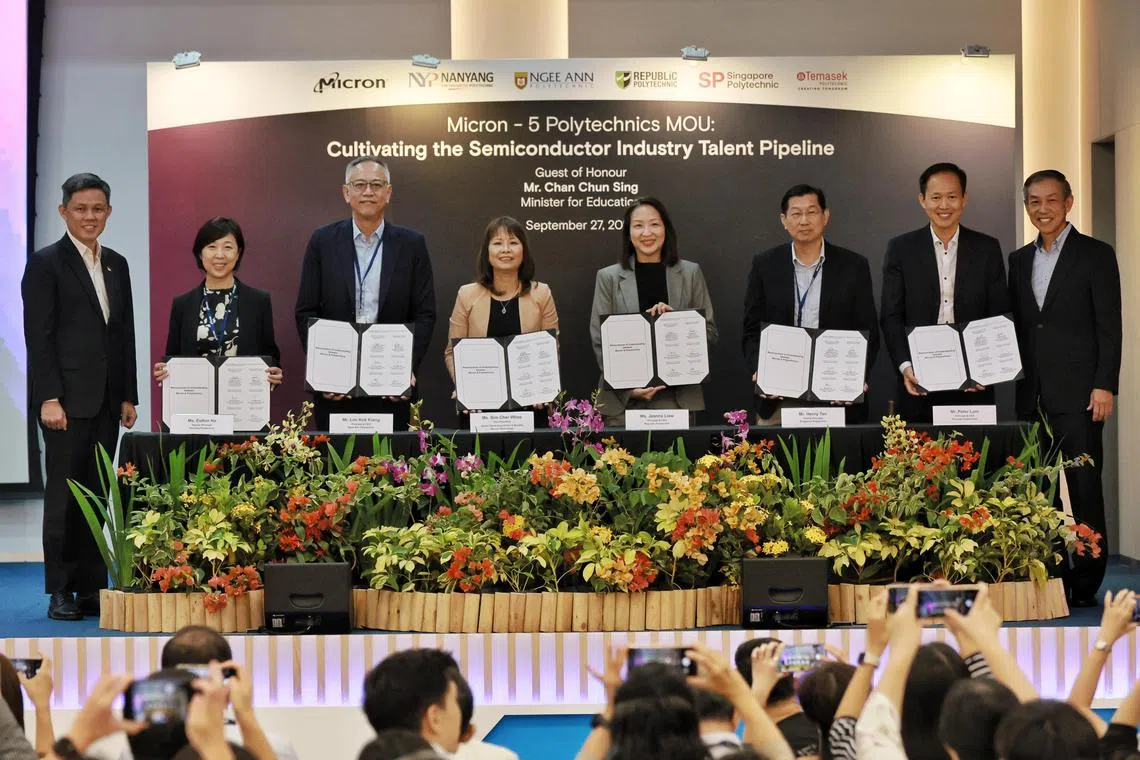New scholarships for semiconductor talent, under tie-up between Micron and polys
Sign up now: Get ST's newsletters delivered to your inbox

Education Minister Chan Chun Sing and Micron’s corporate vice-president and Singapore country manager Chen Kok Sing witnessed the signing of the memorandum of understanding.
ST PHOTO: GIN TAY
SINGAPORE – Twenty new scholarships will be offered each year to students passionate about engineering and looking to enter the semiconductor industry under an agreement that US chipmaker Micron Technology signed on Wednesday with five polytechnics.
Besides scholarships to attract new talent, the collaboration will see the computer memory maker commit to providing upskilling and continuing education and training (CET) programmes to those already in the industry.
Education Minister Chan Chun Sing and Micron’s corporate vice-president and Singapore country manager, Mr Chen Kok Sing, witnessed the signing of the memorandum of understanding at Micron’s expanded wafer fabrication facility in North Coast Drive in Woodlands.
The facility, which was expanded in 2019, manufactures chips that go into solid state drives in smartphones, tablets and computers and which are increasingly deployed in data centres.
The chipmaker said it is the first semiconductor firm to partner polytechnics here to provide their students with a holistic and structured programme as they study a semiconductor curriculum.
Under the tie-up, the chipmaker’s philanthropic arm will offer 20 scholarships to first- and second-year students doing science, technology, engineering and mathematics (Stem) courses.
The scholarships will be equally distributed among the five polytechnics each year, and will also be open to applicants with special educational needs and Malay students through Yayasan Mendaki.
Recipients will get $3,000 a year for the duration of the scholarship, which can be used to pay for learning resources and tuition fees.
The five polytechnics are Nanyang, Ngee Ann, Republic, Singapore and Temasek.
Micron said it also plans to offer internships to at least 100 third-year students identified by the polytechnics every year. They will spend four to six months at the various Micron sites here and undertake projects involving problem-solving and innovations.
Micron’s facilities in Singapore include three memory wafer fabrication plants, as well as a test and assembly centre.
The firm’s vice-president of global talent acquisition, Ms Sim Cher Whee, said Micron views interns as part of its talent strategy. “We select interns with the end in mind, that we want to see them converting and joining us as our team members.”
The semiconductor manufacturer hopes to issue letters of intent to hire at least 80 per cent of exemplary interns upon completion of the programme.
Recipients of these letters will have their skills kept warm through skill refresher courses, networking sessions and other engagement programmes, it added. Male recipients need to complete national service before joining the staff.
CET programmes and individual career development opportunities are another key aspect of the agreement.
Micron will partner the polytechnics to offer advanced diploma courses in robotics and automation for its work-study programmes. The courses will be available to employees who wish to upskill, and polytechnic graduates who wish to extend their learning.
It will also work with the polytechnics to organise visits to its facilities and career talks, where industry leaders and professionals from the Singapore Semiconductor Industry Association share their knowledge with polytechnic students and staff.
Polytechnic educators can also do job shadowing at Micron, where they will gain insight on the semiconductor industry from the company’s engineers, as part of their upskilling and continuous training.
On Wednesday, Mr Chan said he was glad to see companies like Micron working with the polytechnics to nurture local talent.
“Strong industry partnerships are crucial for our institutes of higher learning to continue equipping students with the latest skills and knowledge, and contribute meaningfully to industry once they graduate,” he said.
“This partnership also enables the development of a skilled and nimble workforce that contributes to Singapore’s technological success and global competitiveness.”



